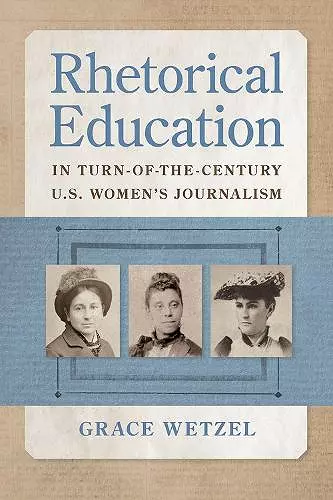Rhetorical Education in Turn-of-the-Century U.S. Women's Journalism
Shari J Stenberg author Grace Wetzel author
Format:Paperback
Publisher:Southern Illinois University Press
Published:30th Nov '23
£42.95
Supplier delay - available to order, but may take longer than usual.

Examining the rhetorical and pedagogical workof three turn-of-the-century newspaperwomen
At the end of the nineteenth century, newspapers powerfully shaped the U.S. reading public, fostering widespread literacy development and facilitating rhetorical education. With new opportunities to engage audiences, female journalists repurposed the masculine tradition of journalistic writing by bringing together intimate forms of rhetoric and pedagogy to create innovative new dialogues. Rhetorical Education in Turn-of-the-Century U.S. Women’s Journalism illuminates the pedagogical contributions of three newspaperwomen to show how the field became a dynamic site of public participation, relationship building, education, and activism in the 1880s and 1890s.
Grace Wetzel introduces us to the work of Omaha correspondent Susette La Flesche Tibbles (Inshata Theumba), African American newspaper columnist Gertrude Bustill Mossell, and white middle-class reporter Winifred Black (“Annie Laurie”). Journalists by trade, these three writers made the mass-circulating newspaper their site of teaching and social action, inviting their audiences and communities—especially systematically marginalized voices—to speak, write, and teach alongside them.
Situating these journalists within their own specific writing contexts and personas, Wetzel reveals how Mossell promoted literary learning and community investment among African American women through a reader-centered pedagogy; La Flesche modeled relational news research and reporting as a survivance practice while reporting for the Omaha Morning World-Herald at the time of the Wounded Knee Massacre; and Black inspired public writing and activism among children from different socioeconomic classes through her “Little Jim” story. The teachings of these figures serve as enduring examples of how we can engage in meaningful public literacy and ethical journalism.
“Bringing together a group of diverse women journalists, Grace Wetzel curates an engaging narrative of community-building, activist journalism that, importantly, pulls these rhetorical figures out of historical record and situates them within a longer legacy of public memory."—Alicia Brazeau, author,Circulating Literacy: Writing Instruction in American Periodicals, 1880-1910
"This extraordinary book is not only an engaging work of recovery, but an insightful combination of feminist historiography and public memory that establishes the significance of these women to the field and considers the politics of race and gender in the ways they have been remembered."—Shevaun E. Watson, editor of Public Memory, Race, and Heritage Tourism of Early America
"Wetzel documents a critical early period of women journalists' influence on American newspaper and media, masterfully weaving rhetorical and pedagogical analysis with the contributions of three trend-setting newspaperwomen and tracing how they used their platform to educate and encourage social action and change. This book serves as an excellent model on how to write and interpret history based on primary text documents."—Cristina D. RamÍrez, author of Occupying Our Space: The Mestiza Rhetorics of Mexican Women Journalists and Activists, 1875-1942
ISBN: 9780809338672
Dimensions: 229mm x 152mm x 17mm
Weight: 64g
276 pages